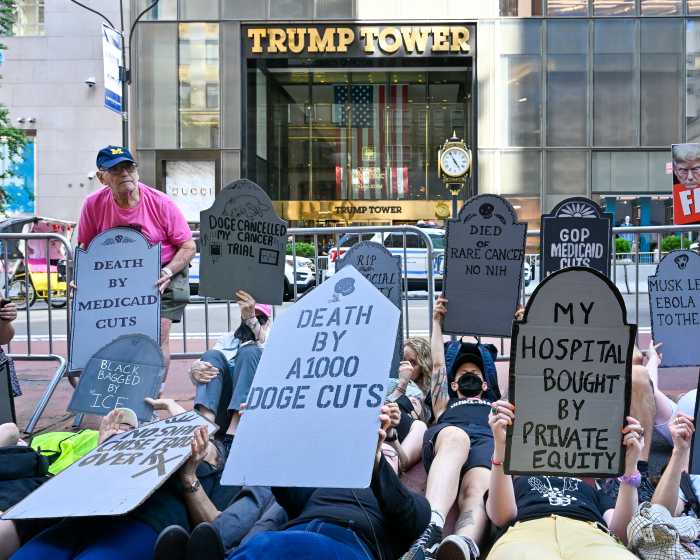One provocative gender-nonconforming street performer has taken his/her protest to the streets.
When a cop gave Qween Amor — who prefers to go by the pronoun “s/he” — a summons May 28 for playing The Verve’s “Bittersweet Symphony” through an amp, the performer took the bumping/grinding/butt-slapping show into the middle of Sixth Avenue in Greenwich Village.
Qween’s performance, duly captured by cell phone videos and shared on social media, incited wistful comments from New Yorkers who viewed the show as a reminder of a more interesting era, when surprising acts of self-expression by artists, dancers and creative types were the norm.
The traffic-slowing show was intended as a political protest, said Qween, who rages on social media about all manners of repression and social injustice, from people being forced to work horrible jobs for low wages to the high cost of education and housing.
“Every year, I face four to five court summonses,” for amplifying music that accompanies sidewalk performances, complained Qween, 26, who has been busking in the city — primarily in Union Square, Chelsea and Greenwich Village — since 2013.
“I don’t pay anything. I show up in court and all the charges are always dismissed. The judges and district attorneys see this is stupid!”
But the hassle infuriates Qween.
Though Qween is most famous for prancing and strutting around the city in a thong, s/he is never issued summonses for indecent exposure, but always for playing music from “an unpermitted amplification device,” s/he says.
But a permit costs about $40 a day, which Qween, who lives in a $200 a month room in Ridgewood, Queens, said s/he can’t afford. Qween had chosen the Greenwich Village sidewalk because it abutted a shuttered store, so as not to block a business. When Qween received a ticket anyway, s/he “decided to do something actually illegal” because “I need my music!”
Favorite tunes backing up the bawdy bump-n-grinds, which can bring Qween as much as $100 in donations, include Abba’s “Dancing Queen,” Bon Jovi’s “It’s My Life” and Queen’s “I Want to Break Free.”
The dancing-in-the avenue performance uplifted Susan LaRosa, marketing and communications deputy officer at The Henry Street Settlement, who filmed the video and shared it on Facebook. “Even with all the homogenization/gentrification of the city, spontaneous acts of ‘art’ still happen, and there is still the possibility of the unexpected,” she explained.
Qween was born in Miami, and fought gender repression in Ft. Lauderdale, eventually stripping in clubs. (Street performances here often evoke certain burlesque moves and nearby poles are frequently conscripted into ad hoc props.) S/he attended a community college in Orlando with the intention of becoming a nurse until financial aid dried up and Qween was forced to quit.
Qween’s current career is to “inspire more artists to go out and display their art in protest; it’s a liberation movement to embrace one’s own freedom,” Qween said.
Qween — who rejects binary he-or-she distinctions — also wants people to understand there is an incredible variety of gender expression.
“I don’t consider myself a transvestite,” s/he says, though s/he often struts about in high heels and a pink tutu. “I’m more queer and gender-nonconforming. I don’t associate myself with a specific gender: I have male genitalia but I feel like a woman inside,” hence the preferred s/he pronoun, Qween explained.
While “there’s nothing male about me emotionally or spiritually,” Qween has zero desire for surgery or hormones to make his/her physique comport with inner thoughts and emotions, as many transgender people — most famously, Caitlyn Jenner — have been motivated to do.
“There’s a huge gay scene in New York, but the queer scene and gender nonconforming scene is still really underground. I get called a [gay slur].” And worse, Qween says s/he was viciously punched in an unprovoked attack in 2013. (While the alleged assailant was caught, the case is apparently still pending, Qween says.)
The assault, just like the recent summons, only strengthened Qween’s resolve to live proud and out loud. “I want to create a world where people are not afraid to be themselves,” explained Qween, noting the high rate of suicide among LGBTQ kids. “A lot of the gays want to be seen as normal. They don’t want to be a stereotype. But I am that gay. That gay is me!”
The flamboyant performances are in part to assure others outside gender norms they are just fine exactly as they are. When young bystanders dance with Qween, “that makes me happy: I know they get it. Some of them have told me I’ve given them courage to face the world and made them feel empowered … I want to create a world where people are not afraid to be themselves.”
(Video by Susan LaRosa)




























